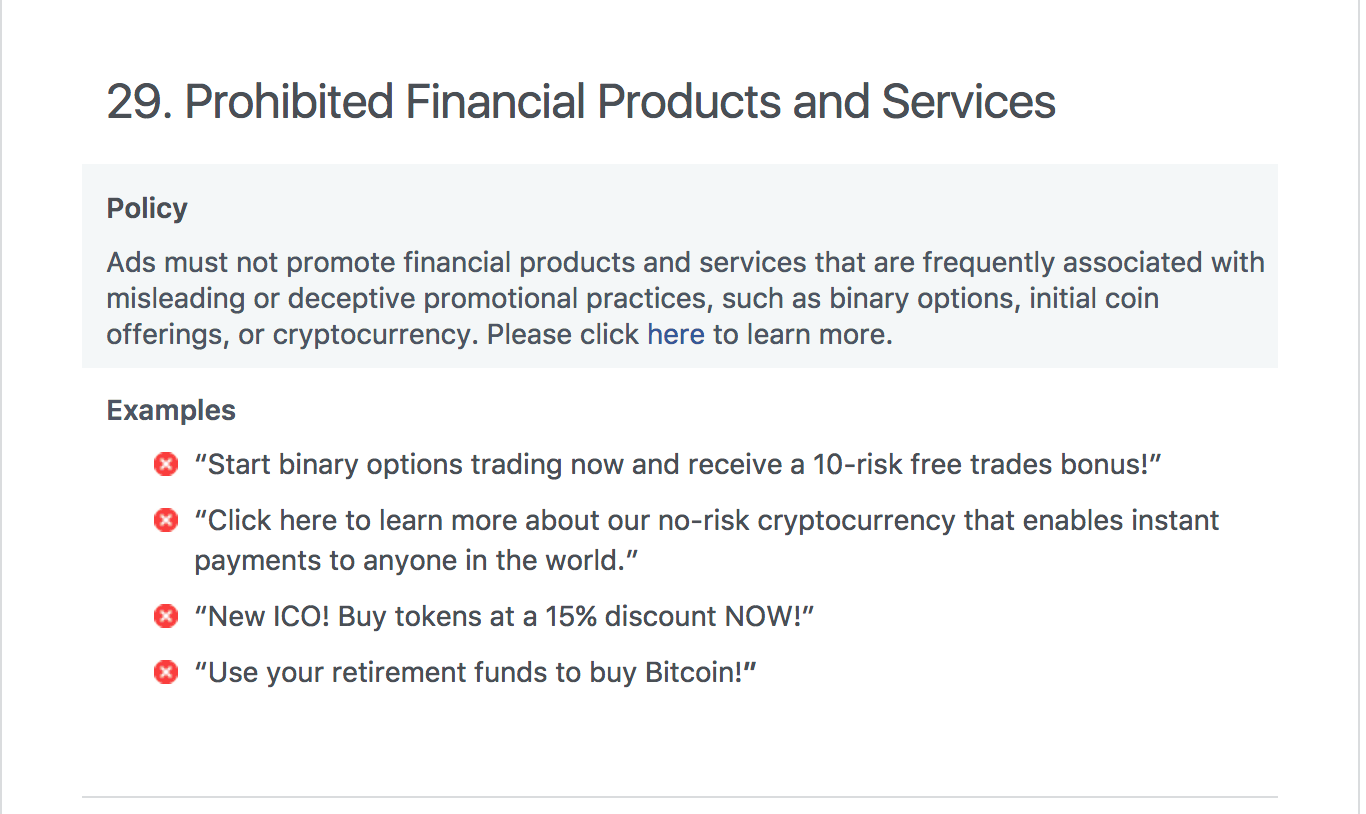Facebook has banned any advertising related to cryptocurrencies

A new paragraph 29 has appeared in the Facebook Ads Policy (Ads Policy). It contains a description of “prohibited financial products and services” that cannot be advertised on a social network. It is forbidden to advertise financial products and services that "are often associated with misleading or deceptive advertising methods." Among these methods, which are often used by fraudsters, are binary options, primary coin placements (ICO) and cryptocurrencies.
Some examples are a few ads, including “Take your retirement savings and buy Bitcoin!”
By banning certain types of advertising, Facebook refers to its advertising principles . “Two of our key advertising principles are that 1) we believe that advertisements must be safe and 2) we work primarily for people. - Explained on the official Facebook blog. “Misleading or deceptive advertising has no place on Facebook.”
')
Note that all the listed methods are not actually fraudulent. The same binary options are standard financial instruments that are traded including on the Chicago Options Exchange and the American Stock Exchange, among others. But apparently the problem is that the rules of binary options are too simple and understandable to the ordinary man in the street, so binary options are often used by fraudsters.
Under the terms of a binary option, the buyer makes a "bet" (buys an option at a fixed price) - and can either win or lose his bet, depending on the fulfillment of the agreed conditions. In case of winning, he receives a fixed amount, in case of loss, the option is burned and the buyer does not receive anything. In a sense, binary options are similar to lottery or bookmaking bets. For example, you buy a binary option for $ 10 for the fact that the stock price goes up - and if you win you get $ 20, and if you lose - nothing.
Probably, Facebook decided that it would be better to stop advertising such “gambling”. The same goes for ICO advertising and cryptocurrency. It is strange, of course, that Facebook refuses a certain part of advertising revenue. But probably, the top management of the site decided that it would be better. Although most recently, on January 4, 2018, Mark Zuckerberg in his blog called cryptocurrency and encryption an important trend . Then he wrote that such technologies return power from the centralized system to the hands of people: “It is interesting to dive into this topic, to study the positive and negative aspects of these technologies in order to best apply them in our services,” he wrote.
"We want people to continue to find and learn about new products and services from Facebook ads without fear of fraud or deception," the official blog said. “However, there are many companies that promote binary options, ICO and cryptocurrency, which currently do not work in good faith.”
Facebook is not able to distinguish bona fide advertisers from scammers, so it blocks several subject areas at once. Facebook representatives explained in the comments of Business Insider that the ban applies to any advertisements related to cryptocurrencies, and not just to buy / sell ads. That is, it is forbidden to advertise and mining equipment, and any software, for example, wallets.
The new rules also apply to other company services, including Instagram and the Audience Network advertising network, through which advertisements are posted on third-party sites and applications other than Facebook.
The company promises to review the policy and cancel the total block if it learns to reliably distinguish between fraudsters and bona fide advertisers in this area.
Facebook also recognizes that blocking by thematic areas is also not capable of providing 100% blocking of advertisements of prohibited topics. Therefore, it encourages all users to send complaints to moderators if they happen to notice such an announcement. Report a violation of the rules by clicking the mouse in the upper right corner of the ad.
In a sense, total blocking can be understood. In fact, it is extremely difficult to distinguish fraudsters with the same ICO. It often happens that the company looks decent, represents an interesting idea and an attractive business plan, then disappears without a trace along with the money received. This industry is not regulated in any way, which is what scammers use.
Source: https://habr.com/ru/post/371219/
All Articles